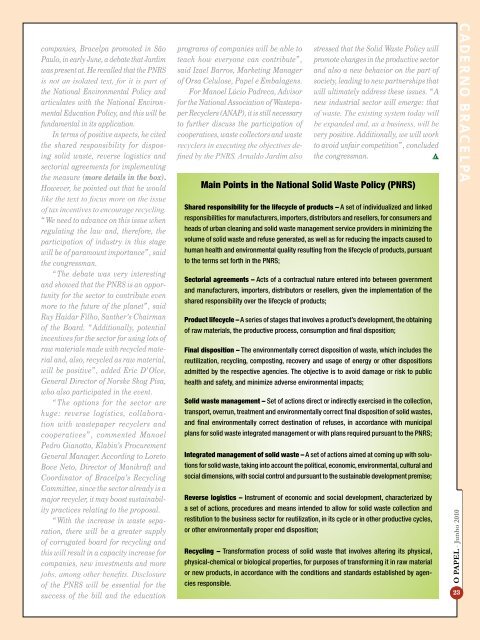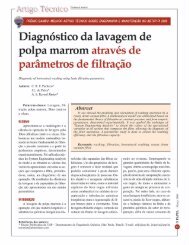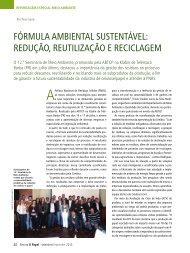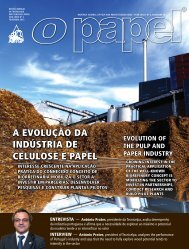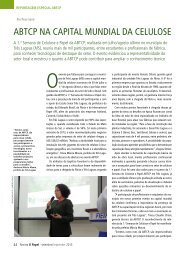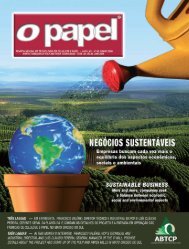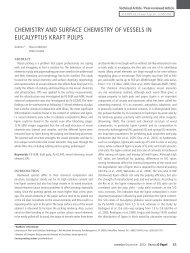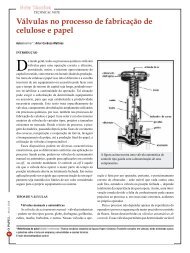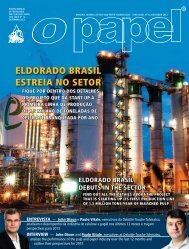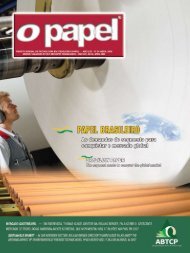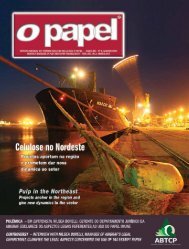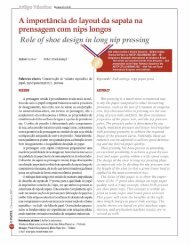Brasil na PulPaper - Revista O Papel
Brasil na PulPaper - Revista O Papel
Brasil na PulPaper - Revista O Papel
Create successful ePaper yourself
Turn your PDF publications into a flip-book with our unique Google optimized e-Paper software.
companies, Bracelpa promoted in SãoPaulo, in early June, a debate that Jardimwas present at. He recalled that the PNRSis not an isolated text, for it is part ofthe Natio<strong>na</strong>l Environmental Policy andarticulates with the Natio<strong>na</strong>l EnvironmentalEducation Policy, and this will befundamental in its application.In terms of positive aspects, he citedthe shared responsibility for disposingsolid waste, reverse logistics andsectorial agreements for implementingthe measure (more details in the box).However, he pointed out that he wouldlike the text to focus more on the issueof tax incentives to encourage recycling.“We need to advance on this issue whenregulating the law and, therefore, theparticipation of industry in this stagewill be of paramount importance”, saidthe congressman.“The debate was very interestingand showed that the PNRS is an opportunityfor the sector to contribute evenmore to the future of the planet”, saidRuy Haidar Filho, Santher’s Chairmanof the Board. “Additio<strong>na</strong>lly, potentialincentives for the sector for using lots ofraw materials made with recycled materialand, also, recycled as raw material,will be positive”, added Eric D’Olce,General Director of Norske Skog Pisa,who also participated in the event.“The options for the sector arehuge: reverse logistics, collaborationwith wastepaper recyclers andcooperatives”, commented ManoelPedro Gianotto, Klabin’s ProcurementGeneral Ma<strong>na</strong>ger. According to LoretoBove Neto, Director of Manikraft andCoordi<strong>na</strong>tor of Bracelpa’s RecyclingCommittee, since the sector already is amajor recycler, it may boost sustai<strong>na</strong>bilitypractices relating to the proposal.“With the increase in waste separation,there will be a greater supplyof corrugated board for recycling andthis will result in a capacity increase forcompanies, new investments and morejobs, among other benefits. Disclosureof the PNRS will be essential for thesuccess of the bill and the educationprograms of companies will be able toteach how everyone can contribute”,said Izael Barros, Marketing Ma<strong>na</strong>gerof Orsa Celulose, <strong>Papel</strong> e Embalagens.For Manoel Lúcio Padreca, Advisorfor the Natio<strong>na</strong>l Association of WastepaperRecyclers (ANAP), it is still necessaryto further discuss the participation ofcooperatives, waste collectors and wasterecyclers in executing the objectives definedby the PNRS. Ar<strong>na</strong>ldo Jardim alsostressed that the Solid Waste Policy willpromote changes in the productive sectorand also a new behavior on the part ofsociety, leading to new partnerships thatwill ultimately address these issues. “Anew industrial sector will emerge: thatof waste. The existing system today willbe expanded and, as a business, will bevery positive. Additio<strong>na</strong>lly, we will workto avoid unfair competition”, concludedthe congressman.Main Points in the Natio<strong>na</strong>l Solid Waste Policy (PNRS)Shared responsibility for the lifecycle of products – A set of individualized and linkedresponsibilities for manufacturers, importers, distributors and resellers, for consumers andheads of urban cleaning and solid waste ma<strong>na</strong>gement service providers in minimizing thevolume of solid waste and refuse generated, as well as for reducing the impacts caused tohuman health and environmental quality resulting from the lifecycle of products, pursuantto the terms set forth in the PNRS;Sectorial agreements – Acts of a contractual <strong>na</strong>ture entered into between governmentand manufacturers, importers, distributors or resellers, given the implementation of theshared responsibility over the lifecycle of products;Product lifecycle – A series of stages that involves a product’s development, the obtainingof raw materials, the productive process, consumption and fi<strong>na</strong>l disposition;Fi<strong>na</strong>l disposition – The environmentally correct disposition of waste, which includes thereutilization, recycling, composting, recovery and usage of energy or other dispositionsadmitted by the respective agencies. The objective is to avoid damage or risk to publichealth and safety, and minimize adverse environmental impacts;Solid waste ma<strong>na</strong>gement – Set of actions direct or indirectly exercised in the collection,transport, overrun, treatment and environmentally correct fi<strong>na</strong>l disposition of solid wastes,and fi<strong>na</strong>l environmentally correct desti<strong>na</strong>tion of refuses, in accordance with municipalplans for solid waste integrated ma<strong>na</strong>gement or with plans required pursuant to the PNRS;Integrated ma<strong>na</strong>gement of solid waste – A set of actions aimed at coming up with solutionsfor solid waste, taking into account the political, economic, environmental, cultural andsocial dimensions, with social control and pursuant to the sustai<strong>na</strong>ble development premise;Reverse logistics – Instrument of economic and social development, characterized bya set of actions, procedures and means intended to allow for solid waste collection andrestitution to the business sector for reutilization, in its cycle or in other productive cycles,or other environmentally proper end disposition;Recycling – Transformation process of solid waste that involves altering its physical,physical-chemical or biological properties, for purposes of transforming it in raw materialor new products, in accordance with the conditions and standards established by agenciesresponsible.O PAPEL - Abril Junho 2006 201023CADERNO BRACELPA


